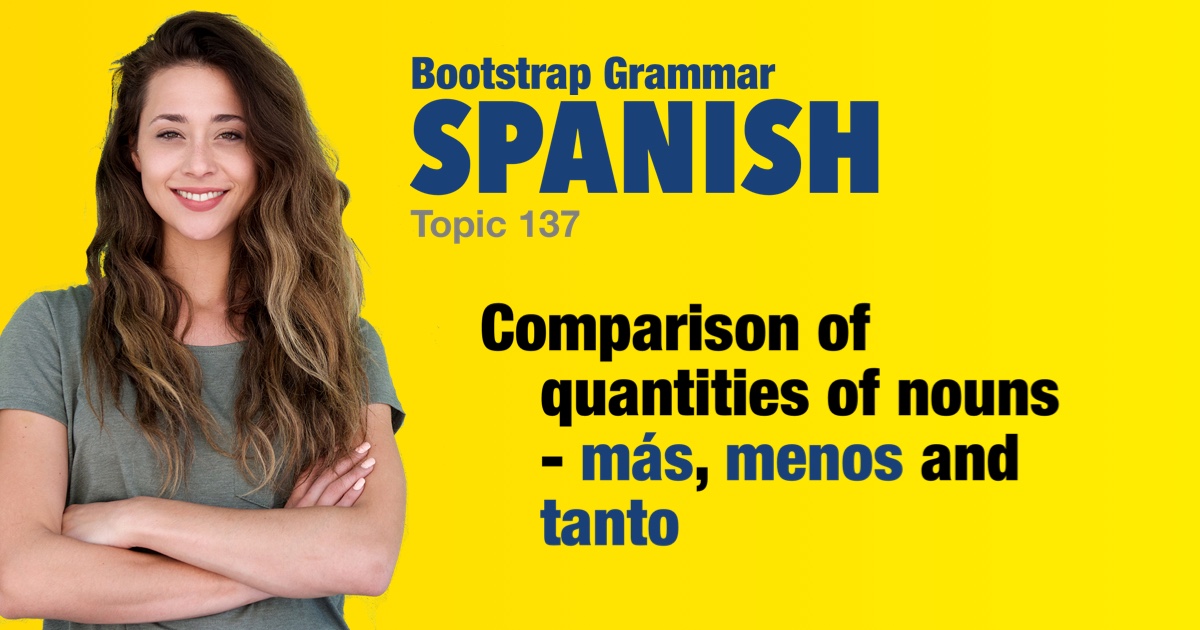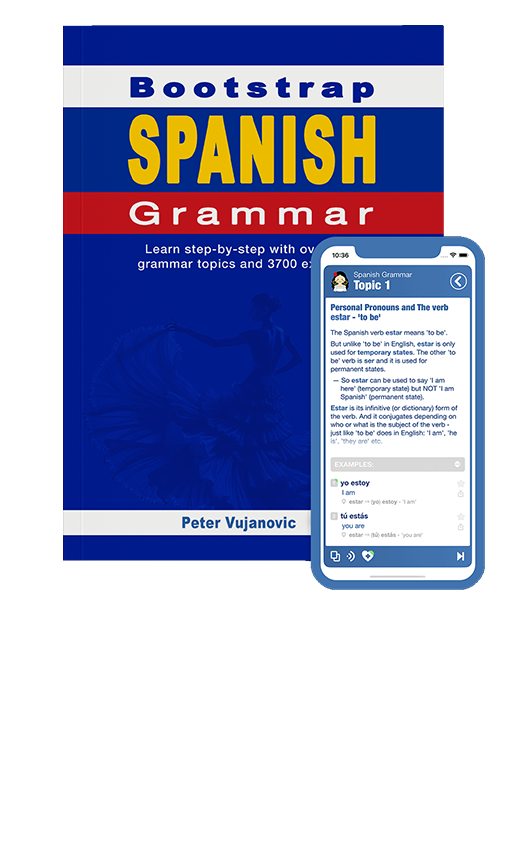Spanish grammar - Comparison of quantities of nouns - más, menos and tanto |
|||
|
|||
The comparative adverbs más ('more'), menos ('less') and tanto ('as much') are used to talk about quantities of nouns. When used to make comparisons, a conjunction (que or como) is added. • más que means 'more than' • menos que means 'less than' • tanto como means 'as much as' Usage notes: 1. When used with numerals, the preposition de is used. 2. When used with a noun, an adjective or an adverb, the compara-tive adverb and que or como are separated. For example más sal que ('more salt than'). 3. When comparing against a pronoun, a subject pronoun (e.g., yo, tú, él, ella, etc.) is used. 4. When comparing two quantities, we use the preposition twice. |
| Examples: | |
|
Tengo más de un libro.
(I) have more than one book.
|
|
|
Ella tiene menos de un euro.
She has less than one euro.
|
|
|
Hay tanto de eso como de aquello.
There is as much of this as of that.
|
|
|
El profesor tiene más de una respuesta.
The teacher has more than one answer.
|
|
|
Compramos menos de una docena de huevos.
(We) buy less than a dozen eggs.
|
|
|
Hay tanto de esto como de aquello en la tienda.
There is as much of this as of that in the store. |
|
|
Pedro tiene más de una idea.
Pedro has more than one idea.
|
|
|
(Nosotros) encontramos menos de una solución.
(We) found less than one solution.
|
|
|
Juan tiene más libros que María.
Juan has more books than María.
|
|
|
El profesor tiene menos paciencia que los estudiantes.
The teacher has less patience than the students.
|
|
|
Nosotros compramos más frutas que verduras.
(We) buy more fruits than vegetables.
|
|
|
Ella bebe menos café que té.
She drinks less coffee than tea.
|
|
|
Ellos comieron más pan que arroz.
They ate more bread than rice.
|
|
|
(Nosotros) tenemos menos tiempo que antes.
(We) have less time than before.
|
|
|
María compró más ropa que zapatos.
María bought more clothes than shoes.
|
|
|
La tienda tiene menos clientes que antes.
The store has fewer customers than before.
|
|
|
¿Tienes tanto dinero como él?
Do (you, familiar) have as much money as him?
|
|
|
¿Lees tanto como tu hermana?
Do (you, familiar) read as much as your sister? |
|
|
Ellos tienen más suerte que nosotros.
They are luckier than us.
|
|
|
¿Compraron tantos regalos como nosotros?
Did (they) buy as many gifts as us?
|
|
|
¿Has hecho tanto ejercicio como él?
Have (you, familiar) done as much exercise as him?
|
|
|
Pedro tiene más ideas que ella.
Pedro has more ideas than her.
|
|
|
Ellos tienen menos paciencia que nosotros.
They have less patience than us.
|
|
|
¿Tú tienes tantos problemas como yo?
Do (you, familiar) have as many problems as me?
|
|
|
Hay más libros de historia que de matemáticas.
There are more history books than math books.
|
|
|
¿Hay menos estudiantes de arte que de ciencias?
Are there fewer art students than science students?
|
|
|
Vendimos más entradas de cine que de teatro.
(We) sold more movie tickets than theater tickets.
|
|
|
Hay menos agua de manantial que de grifo.
There is less spring water than tap water.
|
|
|
Compré más ropa de invierno que de verano.
(I) bought more winter clothes than summer clothes.
|
|
|
Tenemos más clases de matemáticas que de inglés.
(We) have more math classes than English classes.
|
|
|
Mis padres tienen menos tiempo libre que yo.
My parents have less free time than (I) do.
|
|
|
Tengo más paciencia que mis hermanos.
(I) have more patience than my siblings.
|
|
 |
|


 With numerals, use the preposition
With numerals, use the preposition 
